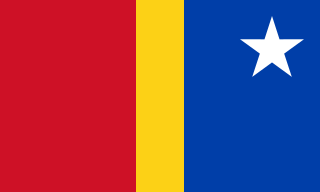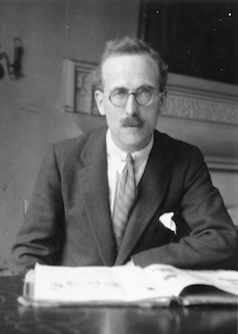Gallery
- Kwamsa
Percy Graham Harris | |
|---|---|
| Born | 1894 St. Bees, England |
| Died | 1945 |
| Citizenship | Great Britain |
| Occupation(s) | British administrative officer, rank of Resident. Served in Colonial Nigeria and British Cameroons |
| Employer | Nigerian Administrative Service |
| Known for | service in British colonies in Nigeria. Papers submitted to Royal Anthropological Institute. |
Percy Graham Harris was a British administrator in Nigeria from 1919-1945 and a Fellow in the Royal Anthropological Institute (RAI). [1] He published articles under the name P. G. Harris in the RAI's journal, including information on Nigerian peoples, languages (including sign language), naming practices, music and agriculture.
Harris served in World War I with the King's Liverpool Regiment. He also served in the Nigeria Regiment. After the war, he joined the British Administrative Service in 1919, serving until his death in 1945. He reached the rank of Resident in the service by 1934, and was promoted to the Staff grade in 1938. He became a Companion (C.M.G.) in the Most Distinguished Order of St Michael and St George in 1945. [1]
His time in the Nigeria Regiment led him to studies in anthropology, and he graduated from the London University with a diploma in anthropology. [1] He became a Fellow with the Royal Anthropological Institute in 1927 and contributed papers until his death. [1]

Sir Edward Burnett Tylor was an English anthropologist, and professor of anthropology.

Northern Nigeria was a British protectorate which lasted from 1900 until 1914, and covered the northern part of what is now Nigeria.

Muhammadu Bello was the first Caliph of Sokoto and reigned from 1817 until 1837. He was also an active writer of history, poetry, and Islamic studies. He was the son and primary aide to Usman dan Fodio, the founder of the Sokoto Caliphate and the first caliph. During his reign, he encouraged the spread of Islam throughout the region, increasing education for both men and women, and the establishment of Islamic courts. He died on October 25, 1837, and was succeeded by his brother Abu Bakr Atiku and then his son, Aliyu Babba.

Northern Nigeria was an autonomous division within Nigeria, distinctly different from the southern part of the country, with independent customs, foreign relations and security structures. In 1962, it acquired the territory of the British Northern Cameroons, which voted to become a province within Northern Nigeria.

Amina was a Hausa historical figure in the city-state Zazzau, in what is now in the north-west region of Nigeria. She ruled in the mid-sixteenth century.
Gobir was a city-state in what is now Nigeria. Founded by the Hausa in the 11th century, Gobir was one of the seven original kingdoms of Hausaland, and continued under Hausa rule for nearly 700 years. Its capital was the city of Alkalawa. In the early 19th century elements of the ruling dynasty fled north to what is today Niger from which a rival dynasty developed ruling as Sarkin Gobir at Tibiri. In 1975 a reunited traditional sultanate took up residence in Sabon Birni, Nigeria.

North Efate, also known as Nakanamanga or Nguna, is an Oceanic language spoken on the northern area of Efate in Vanuatu, as well as on a number of islands off the northern coast – including Nguna, and parts of Tongoa, Emae and Epi.

Nsibidi is a system of symbols or proto-writing developed by the Ekpe secret society that traversed the southeastern part of Nigeria. They are classified as pictograms, though there have been suggestions that some are logograms or syllabograms.

Sir John Rankine Goody was an English social anthropologist. He was a prominent lecturer at Cambridge University, and was William Wyse Professor of Social Anthropology from 1973 to 1984.

Warrant for Genocide: The Myth of the Jewish World-Conspiracy and the Protocols of the Elders of Zion, by Norman Cohn, is a critical work about The Protocols of the Elders of Zion, published in 1966.
Teknonymy is the practice of referring to parents by the names of their children. This practice can be found in many different cultures around the world. The term was coined by anthropologist Edward Burnett Tylor in an 1889 paper. Such names are called teknonyms, teknonymics, or paedonymics.

Dalla Hill is a hill in Kano, Kano State, Nigeria. It is 534 metres (1,753 ft) high and contains a stairway with 101 steps to the bottom to top.
A series of massacres were committed against Igbo people and other people of southern Nigerian origin living in northern Nigeria starting in May 1966 and reaching a peak after 29 September 1966. Between 8,000 and 30,000 Igbos and easterners have been estimated to have been killed. A further 1 million Igbos fled the Northern Region into the East. In response to the killings some northerners were massacred in Port Harcourt and other eastern cities. These events led to the secession of the eastern Nigerian region and the declaration of the Republic of Biafra, which ultimately led to the Nigeria-Biafra war.

The Kano Emirate was a Muslim state in northern Nigeria formed in 1805 during the Fulani jihad when the Muslim Hausa-led Sultanate of Kano was deposed and replaced by a new emirate which became a vassal state of the Sokoto Caliphate. During and after the British colonial period, the powers of the emirate were steadily reduced. The emirate is preserved and integrated into modern Nigeria as the Kano Emirate Council.

The pre-colonial history of Northern Nigeria encompasses the history of Northern Nigeria before the advent of European explorers and the subsequent pacification of Northern Nigeria by the British Empire. In pre-historical times, the area known as Northern Nigeria was home to the Kwatarkwashi/Nok culture. Elements of human civilisation have also been discovered around the Niger River near Kainji Dam.
Cyril Daryll Forde FRAI was a British anthropologist and Africanist.

Leonard Halford Dudley Buxton, known as L. H. Dudley Buxton, was a British anthropologist. He was educated at Radley College and at Exeter College, Oxford, and he was Reader in Physical Anthropology at the University of Oxford between 1928 and 1939. He conducted field work in Sudan, India, Malta, the United States, China and Mesopotamia, and in 1913 he excavated Lapithos in Cyprus under the direction of professor John Myres and Cyprus Museum curator Menelaos Markides. During his extensive travels he documented his work through photography; the pictures are currently in the Pitt Rivers Museum. In the 1930s he carried research in Oxford with anthropologist Beatrice Blackwood. He collected textiles that are currently in the Pitt Rivers Museum in Oxford, the Bankfield Museum in Halifax and the British Museum. From 1914 to 1918 he served with the Queen's Own Cameron Highlanders in France and in the Intelligence Corps. He died on 5 March 1939.
Daud Dan Bawo, also known as Bagauda or Yakano, was the first King of Kano, in what is now northern Nigeria, reigning from 999 to 1063. He established a dynasty which would go on to rule the state for over 800 years. According to the Kano Chronicle, all subsequent kings and sultans of Kano descended from him.
Dakarkari people, also known as Lelna or Dakkarawa, are one of the ethnic groups in Nigeria, with an approximate population of 136,000. They are mainly found in Zuru, Donko-Wasagu, and Sakaba Local Government Areas of Kebbi State and some other local governments in Niger State like Rijau and Mariga. They are divided into different sub-groups which are Bangawa, Kafawa, Kelawa, and Lilawa. Today, they can be found in Kebu, Roma, Dogo, Isgogo, Dabai, Rikoto, Peni, Zuru, Manga, Senchi, Ushe, Tadurga, Diri, Ribah, Conoko and Rade.

The Huxley Memorial Medal and Lecture is a lecture and associated medal that was created in 1900 by the Royal Anthropological Institute of Great Britain and Ireland to honour the anthropologist Thomas Henry Huxley. The lecture and medal are awarded annually to any scientist who distinguishes themselves in any field of anthropological research. Thomas Huxley was fortunate to have another memorial lecture named his honour, The Huxley Lecture that was instituted by the members of Charing Cross Hospital Medical School in 1896.